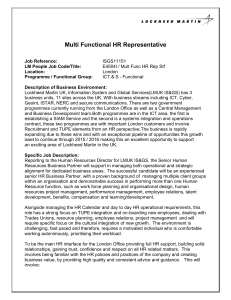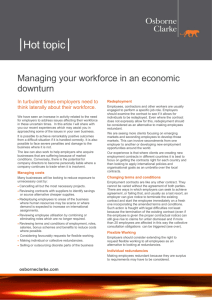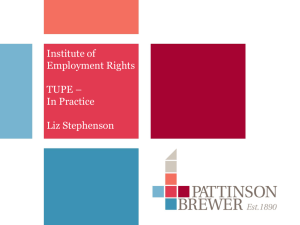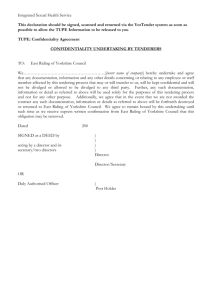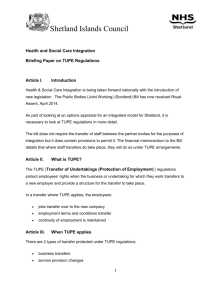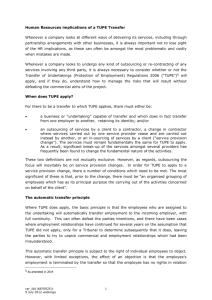2014 changes to TUPE
advertisement
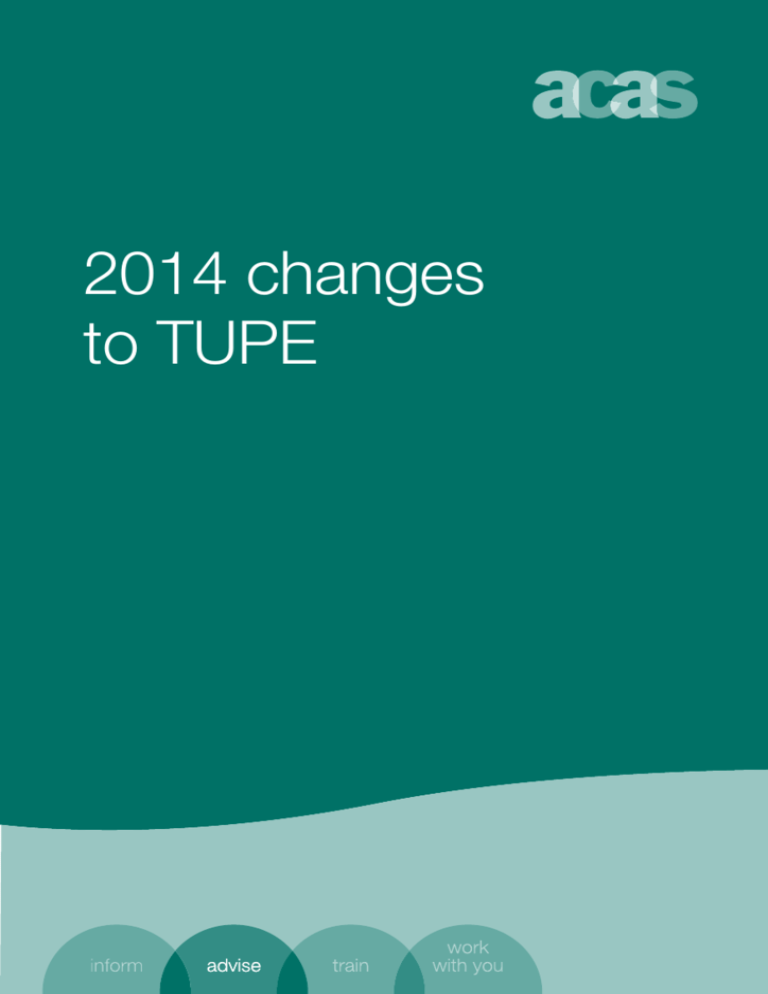
2014 changes to TUPE Acascan help withyour employmentrelationsneeds Every year Acas helps employers and employees from thousands of workplaces. That means we keep right up to date with today’s employment relations issues – such as discipline and grievance handling, preventing discrimination and communicating effectively in workplaces. Make the most of our practical experience for your organisation – find out what we can do for you. We inform We answer your questions, give you the facts you need and talk through your options. You can then make informed decisions. Contact us to keep on top of what employment rights legislation means in practice – before it gets on top of you. Call our helpline 08457 47 47 47 or visit our website www.acas.org.uk. We advise and guide We give you practical know-how on setting up and keeping good relations in your organisation. Look at our publications on the website or ask our helpline to put you in touch with your local Acas adviser. Our Equality Direct helpline 08456 00 34 44 advises on equality issues, such as discrimination. We train From a two-hour session on the key points of new legislation or employing people to courses specially designed for people in your organisation, we offer training to suit you. Look on the website for what is coming up in your area and to book a place or talk to your local Acas office about our tailored services. We work with you We offer hands-on practical help and support to tackle issues in your business with you. This might be through one of our well-known problem-solving services. Or a programme we have worked out together to put your business firmly on track for effective employment relations. You will meet your Acas adviser and discuss exactly what is needed before giving any go-ahead. Contents TUPE is changing 2 Changes at a glance 3 Does TUPE apply to my business? Change 1: The activities carried out under outsourced or tendered work must be “fundamentally the same” for TUPE to apply 4 5 Changes to terms and conditions 6 Change 2: Altering contractual terms and conditions 6 Change 3: Dismissals are no longer automatically unfair because of a change in the workplace location 8 Change 4: T erms and conditions from collective agreements may be renegotiated after one year provided that overall the contract is no less favourable to the employee 9 Change 5: In some circumstances contractual changes arising from new collective agreements agreed by the outgoing employer are not required to be incorporated after a transfer 10 Dismissals and redundancies 11 Change 6: An employee will be automatically unfairly dismissed if the sole or principal reason for the dismissal is the transfer 11 Change 7: Redundancy consultation can begin before the transfer if both employers agree 12 Employee liability information 13 Change 8: Information about transferring employees should be given earlier14 Information and consultation requirements 15 Change 9: Businesses with fewer than 10 employees are not required to invite the election of representatives for consultation purposes if no existing arrangements are in place 15 Further information 16 2014 CHANGES TO TUPE 1 TUPE is changing On 31 January 2014, the new regulations on TUPE came into effect updating the 2006 regulations. This leaflet summarises only those changes. What is TUPE? TUPE means the “Transfer of Undertakings (Protection of Employment) Regulations” They apply to organisations of all sizes and protect employees’ rights when the business they work for transfers to a new employer. The TUPE Regulations apply when a business is sold, activities are outsourced, or brought back in-house. What impact does TUPE have on my business? Employees from the newly-acquired business or contract will transfer automatically to the incoming employer. Their terms and conditions of employment and continuity of service are preserved and transfer at the same time and they also receive certain protections around dismissal and redundancy. This means they take their length of service with them as if they had always worked for the incoming employer. Employers should take the TUPE rules into account when deciding: ●● ●● how much to pay for a business or how much to bid for a contract the timetables involved in a transfer due to legal requirements such as consultation periods. There are impacts for: ●● ●● ●● 2 the employer who is making the transfer (also known as the outgoing employer, the ‘old employer’ or the transferor) the employer who is taking on the transfer (also known as the incoming employer, the ‘new employer’ or the transferee) employees, TUPE transfers can have an impact on morale, performance, health and wellbeing. 2014 CHANGES TO TUPE Changes at a glance Relevant transfers Service provision changes Change 1: The activities carried out under outsourced or tendered work must be “fundamentally the same” for TUPE to apply. Contracts of employment Change 2: Altering contractual terms and conditions. Change 3: Dismissals are no longer automatically unfair because of a change in the workplace location. Changes to terms and conditions Change 4: Terms and conditions from collective agreements may be renegotiated after one year provided that overall the contract is no less favourable to the employee. Change 5: In some circumstances contractual changes arising from new collective agreements agreed by the outgoing employer are not required to be incorporated after a transfer. Dismissals and redundancies Dismissal Change 6: An employee will be automatically unfairly dismissed if the sole or principal reason for the dismissal is the transfer. Redundancy Change 7: Redundancy consultation can begin before the transfer if both employers agree. Employee liability information (ELI) ELI Change 8: Information about transferring employees should be given earlier. Information and consultation rights Who should be consulted? Change 9: Businesses with fewer than 10 employees are not required to invite the election of representatives for consultation purposes if no existing arrangements are in place. 2014 CHANGES TO TUPE 3 Does TUPE apply to my business? TUPE applies to the private sector and the public sector and there are two situations when the regulations may apply. Collectively these are called “relevant transfers”. Situation 1: Business transfer The TUPE Regulations apply if a business or part of a business is bought or sold. But they won’t apply if just shares, assets or equipment are transferring to a different owner. Also, the business must continue to trade in the same way after the transfer as it did before the transfer. These types of transfers are called business transfers. There is no change to TUPE here. Situation 2: Outsourcing and contracting The TUPE regulations apply in the following situations: ●● a client outsources to a contractor ●● a new contractor takes over activities from another contractor ●● a client takes activities back in-house from a contractor. These types of transfer are called service provision changes. The courts have decided that for the TUPE Regulations to apply to service provision changes, the following must apply immediately before the transfer: ●● ●● ●● 4 An organised grouping of employees must exist. The group has to be deliberately organised by the employer to provide a service for a particular client. Employees randomly or coincidentally working together on the work transferring are unlikely to meet this requirement. Employees should be assigned to the group. The roles that transfer should be linked to the delivery of services for that particular client. Employees who carry out activities not related to the tender are unlikely to be part of the group. This could include managers who work on maintaining relations with the client. The client should remain the same. If the client changes there will be no TUPE transfer. 2014 CHANGES TO TUPE ●● ●● ●● The activities should not become fragmented at the point of transfer. The more split up the activities become between different providers the less likely it is that the TUPE regulations will apply. The activities should not be mainly the supply of goods for the client’s use. Supply of goods only is not a supply of services. The activities should remain fundamentally the same – see change 1. Change 1: The activities carried out under outsourced or tendered work must be “fundamentally the same” for TUPE to apply The new regulations state that for TUPE to apply, the activities being done before and after the transfer should be “fundamentally the same”. TUPE likely to apply Carole’s Systems contracted with John’s Catering to cook and serve hot dinners in the company canteen. The new contractor continues to provide the same service but they supply new utensils and the ingredients are sourced from a different supplier. TUPE is likely to apply as the activities are ‘fundamentally the same’. TUPE unlikely to apply John’s Catering served hot dinners in Carole’s Systems company canteen. When the contract expired Carole’s Systems decided to change the terms to provide and stock self-service fridges containing pre-prepared sandwiches, salads and drinks. Rachid’s Catering won the tender but TUPE is unlikely to apply to the staff of John’s Catering because the activities are not ‘fundamentally the same’. This amendment applies to transfers on or after 31 January 2014. 2014 CHANGES TO TUPE 5 Changes to terms and conditions following a TUPE transfer Under the TUPE Regulations, existing terms and conditions transfer with staff to the incoming employer and they remain the same as they were with the outgoing employer. Following a transfer employers may seek to change terms and conditions, but working out when, how and if changes can be made is difficult, and employers seeking to vary terms and conditions may still face a claim of constructive dismissal. This area of TUPE is complex so if the change is not directly related to the transfer employers should first read the Acas leaflet ‘Varying a contract of employment’ www.acas.org.uk/varyingacontract Employers should seek professional/legal advice where appropriate. If the change is related to the transfer – see change 2. Change 2: Altering contractual terms and conditions Under TUPE it will continue to be the case that changes to employees’ terms and conditions if the sole or principal reason is the transfer will be void. Previously, changes to terms and conditions for a reason ‘connected to the transfer’ were also invalid, but this has now been removed. However changes may be valid: ●● ●● ●● If the sole or principal reason is an “Economic, Technical or Organisational reason entailing changes in the workforce” and provided the employer and employee agree the change (see below). If the terms of the contract would have allowed the employer to make the change anyway, or a new development arises. For example the employer wins an order from a new client and has to bring in change to meet the needs of the new client. The employer should consult and seek agreement about any changes or explain in writing why points raised cannot be carried forward. This is a complex area and legal advice should be sought before action is taken. These amendments apply to variations agreed on or after 31 January 2014 and transfers which take place on or after 31 January 2014. 6 2014 CHANGES TO TUPE Economic, technical or organisational (ETO) reasons Changes to terms and conditions in a transfer situation can only be valid if the following requirements apply: ●● ●● There must be an ETO reason. This means there have to be valid business reasons for the change. The ETO reason must ‘entail changes in the workforce’. This means that changes to workforce numbers or job functions must be the objective of the plan, not just a possible consequence of it. An ETO reason cannot be used just to reduce labour costs or harmonise terms and conditions with existing employees, and ultimately it is for the courts to decide whether the change is valid. This is a complex area and legal advice should be sought before action is taken. Change in workplace location A common change in transfer situations is a change to the workplace location and amendments to TUPE specifically state that such moves may now be considered as a fair ETO reason – see change 3. 2014 CHANGES TO TUPE 7 Change 3: Dismissals are no longer automatically unfair because of a change in the workplace location Previously, moving transferring employees to another work location was difficult because such changes were likely to be automatically unfair if challenged. Under the new rules, dismissals resulting from the change of workplace won’t be automatically unfair as they will be covered by an ETO reason. However, they may still be unfair depending on the facts. For example Carole’s Bus Company won the contract to provide a bus service. Following the transfer employees were required to work from a different depot 16 miles away. Under the old rules The employees refused to move and resigned arguing this was a substantial change to their working conditions. At the tribunal they were found to have been automatically unfairly dismissed. Under the new rules During consultation prior to the transfer, Carole’s Bus Company put forward a range of support proposals to reduce the effects of the location change, including a severance package and was able to defend the dismissals at the tribunal. These amendments apply to variations agreed on or after 31 January 2014 and transfers which take place on or after 31 January 2014. Changes to collective agreements Collective agreements which are in place at the time of the transfer will also transfer to the incoming employer. A collective agreement negotiated between an employer and a trade union may include matters such as pay rates, hours and other terms. Many collective agreements continue indefinitely whilst some cover specific periods. The following two changes specify when the terms incorporated from collective agreements may be modified in transfer situations – see changes 4 and 5. 8 2014 CHANGES TO TUPE Employers should be aware that as well as legal implications to this change, there are also industrial relations considerations, for example how disagreements over proposed changes may be handled. Change 4: Terms and conditions from collective agreements may be renegotiated after one year provided that overall the contract is no less favourable to the employee Incoming employers will be able to renegotiate terms and conditions agreed in a collective agreement one year after the transfer as long as the overall change is no less favourable to the employees involved. This only covers the part of an employee’s terms and conditions that are covered by a collective agreement. Other changes are subject to standard TUPE protection. For example Carole’s Cleaning bought a part of John’s Cleaning. There is a collective agreement in place at John’s Cleaning under which a trade union is recognised and has bargaining rights for pay. The weekly pay rate at John’s Cleaning is higher than that at Carole’s Cleaning though the working week is longer. Under the old rules Any changes to pay where the sole or principal reason is the transfer will be unlawful. Under the new rules After a year, changes to pay can be agreed provided that the overall terms and conditions are no less favourable. Carole’s Cleaning negotiate a reduction in weekly pay whilst maintaining the overall benefits package for the ex employees of John’s Cleaning. These amendments apply to variations agreed on or after 31 January 2014 and transfers which take place on or after 31 January 2014. 2014 CHANGES TO TUPE 9 Change 5: In some circumstances contractual changes arising from new collective agreements agreed by the outgoing employer are not required to be incorporated after a transfer The new regulations now reflect a recent court decision about collective agreements which pass to the incoming employer. This is referred to as the “static approach” and the changes mean the incoming employer is: ●● ●● still bound by the collective agreement in force at the time of transfer, but no longer bound by changes negotiated and agreed by the outgoing employer after the date of transfer where the incoming employer is not a party to the process. For example Carole’s Cleaning bought a part of John’s Cleaning. There is a collective agreement in place at John’s Cleaning under which a trade union is recognised and has bargaining rights for pay. Four months after the transfer, John’s Cleaning reach agreement with the trade union for a 3% pay increase. Under the old rules Depending on the terms of the employees’ contracts, Carole’s Cleaning might have been obliged to increase the pay of the ex John’s Cleaning employees by 3%. Under the new rules Carole’s cleaning was not a party to the process so will not be obliged to increase the pay of the ex John’s Cleaning employees. These changes apply to TUPE transfers which take place on or after 31 January 2014. 10 2014 CHANGES TO TUPE Dismissals and redundancies Incoming and outgoing employers are often able to minimise or prevent redundancies and other dismissals when transfers take place. However there will be occasions when they cannot be avoided. If the dismissal was going ahead regardless of the transfer or a new development arises, then TUPE regulations are unlikely to apply. However, if the sole or principal reason for the dismissal was the transfer, it will be treated as automatically unfair if challenged. Previously, the regulations specifically stated that dismissing for a reason ‘connected with the transfer’ would trigger automatic unfair dismissal too. This wording has been removed but a careful approach is advisable – see change 6. Change 6: An employee will be automatically unfairly dismissed if the sole or principal reason for the dismissal is the transfer Under TUPE it will continue to be automatically unfair to dismiss an employee because of the transfer itself. Previously changes to terms and conditions for a reason ‘connected to the transfer’ were also automatically unfair but this has now been removed. However dismissals may be fair if: ●● ●● The reason for the dismissal is an “Economic, Technical or Organisational reason entailing changes in the workplace”. The dismissal can be shown to be for genuine redundancy reasons and the employer followed a fair dismissal procedure. These changes apply to TUPE transfers which take place on or after 31 January 2014. They apply to notice of dismissal given after 31 January 2014, or where no notice is given where termination takes effect on or after 31 January 2014. Where a genuine redundancy situation arises as a result of a transfer, there is a need both collectively and individually to consult with affected employees when the new employer is making (or intending to make) 20 or more redundancies within a 90-day period. Where there are fewer than 20 employees being made redundant within a 90-day period, there is still a legal requirement to individually consult but there are no prescribed time limits in which to do so. For more information on redundancy, go to: www.acas.org.uk/redundancy 2014 CHANGES TO TUPE 11 Post-transfer redundancy dismissals The 2014 changes allow for redundancy consultation in respect of posttransfer redundancies to begin before the transfer and continue after the transfer, but employers should not make selection for redundancy before the transfer takes place. Employers are obliged to consult about TUPE before and after the transfer and the change means that both types of consultation will be able to run concurrently. However for this to be effective there must be good open dialogue between employers, elected representatives or a recognised trade union and employees. Because these changes are new it is advisable for employers to seek legal advice before taking action – see change 7. Change 7: Redundancy consultation can begin before the transfer if both employers agree Where the incoming employer intends making 20 or more redundancies after the transfer, collective redundancy consultation may begin before the transfer if the outgoing employer agrees. For example Carole’s Cleaning wants to buy John’s Cleaning and knows that there will not be sufficient work for both sets of employees, concluding that some redundancies will be needed. Under the old rules Before the transfer, each employer consults with their own employees and elected representatives about the transfer only. After the transfer Carole’s Cleaning continue to consult about the transfer and also begin redundancy consultation with both sets of staff. Under the new rules Before the transfer, both employers agree to pre-transfer redundancy consultation and begin consultation at an early stage with elected representatives and employees about the transfer and redundancies at the same time. This change applies to TUPE transfers which take place on or after 31 January 2014. 12 2014 CHANGES TO TUPE Employee liability information The outgoing employer has a duty to provide information about the transferring employees to the incoming employer. This is called Employee Liability Information and includes: ●● identity of the transferring employees ●● age of the transferring employees ●● employment particulars of the transferring employees ●● disciplinary and grievance records of the transferring employees ●● details of any relevant collective agreements ●● details of any outstanding claims the transferring employees have against the outgoing employer – see change 8. 2014 CHANGES TO TUPE 13 Change 8: Information about transferring employers should be given earlier TUPE Regulations have been amended so that information under the new rules must be provided by the outgoing employer to the incoming employer not less than 28 days before the transfer, rather than 14 days before transfer as previously. This increase gives the incoming employer more time to plan ahead and prepare for their new staff. For example Under the old rules Once John’s cleaning are told they are to be sold to Carole’s cleaning they provide employee liability information 14 days before the transfer in accordance with the rules. However Carole’s cleaning find it difficult to set up the payroll and human resource system in time for the transfer. Under the new rules Once John’s cleaning are told they are to be sold to Carole’s cleaning they provide the employer liability information 28 days before the transfer. This allows Carole’s cleaning to set up the payroll and human resource systems in good time to welcome their new employees on day one. These amendments apply to transfers which take place on or after 1 May 2014. 14 2014 CHANGES TO TUPE Information and consultation requirements TUPE regulations require incoming and outgoing employers to: ●● ●● inform/consult with elected representatives of the affected workforce before the transfer arrange for the election of employee representatives if there is no recognised trade union or group of appropriate representatives. Previously, the second part of this rule applied no matter how small the workforce, but the changes have provided an exception for micro businesses which have been defined as those with fewer than 10 employees – see change 9. Change 9: B usinesses with fewer than 10 employees are not required to invite the election of representatives for consultation purposes if no existing arrangements are in place The TUPE Regulations have been amended so micro businesses no longer need to invite the election of representatives for consultation purposes for their part of the process. They must still inform and consult directly with each employee about the transfer. Where a recognised union or existing group of employee representatives already exist, the micro business will still need to collectively and/or individually consult as usual. For example Stewart’s Cleaners, a non-unionised micro business with five employees have been bought by Natalia’s Cleaners. Under the old rules Stewart’s Cleaners arrange an election before the transfer and two representatives are elected. The Employer consults with representatives and employees before the transfer. Under the new rules As a non-unionised micro business Stewart’s Cleaners are not required to elect representatives. They just need to consult directly with all employees. These amendments apply to transfers which take place on or after on or after 31 July 2014. 2014 CHANGES TO TUPE 15 Further information Acas is currently developing further guidance concerning the TUPE regulations in general. Go to www.acas.org.uk/TUPE for further details. To see a copy of the amended regulations and the revised guidance from BIS on TUPE which cover the 2014 changes, visit www.gov.uk/BIS. 16 2014 CHANGES TO TUPE Information in this booklet has been revised up to the date of the last reprint – see date below. For more up-to-date information go to the Acas website www.acas.org.uk. Legal information is provided for guidance only and should not be regarded as an authoritative statement of the law, which can only be made by reference to the particular circumstances which apply. It may, therefore, be wise to seek legal advice. Acas aims to improve organisations and working life through better employment relations. We provide up-to-date information, independent advice, high quality training and we work with employers and employees to solve problems and improve performance. We are an independent, publicly-funded organisation and many of our services are free. January 2014 Acas’ offices: • National • South East • East Midlands • South West • East of England • West Midlands • London • Yorkshire and Humber London Fleet, Hampshire Nottingham Bristol Bury St Edmunds, Suffolk Birmingham Leeds • North East Newcastle upon Tyne • Scotland Glasgow • North West • Wales Manchester Cardiff • North West Liverpool Helpline 08457 47 47 47 18001 08457 47 47 47 Acas Helpline Text Relay To view a full list of Acas publications go to www.acas.org.uk/publications 08457 38 37 36 Acas Customer Services Team who can provide details of services and training in your area or visit www.acas.org.uk/training www.acas.org.uk 01/14 Ref: AL20 08456 00 34 44 for questions on managing equality in the workplace
